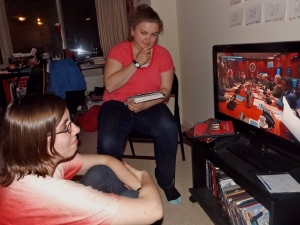
This post is written by UHP student and SURE Award winner Kara Dunford.
Television viewers across the country need little more than a remote to explore life inside our nation’s political arena, as writers for series such as The West Wing, Veep, and most recently, House of Cards present their own imagined political realities via scripted programming.
While this entertainment content is certainly distinct from news content, several scholars have explored how the effects of fictional media on viewer opinion compare to the effects of news media. My coursework in the School of Media and Public Affairs granted me a foundation in the theories of media effects and when it came time to choose a topic for my senior thesis, I wanted to combine this knowledge with my love for fictional political television.
My project sought to determine how fictional portrayals of female politicians impact viewer opinion of female candidates in a real-world setting. Using a three-group experimental design, I tested the persuasive and priming effects of Commander in Chief, the television show starring Geena Davis as the first female president.
The UHP/SURE award enabled me to incentivize students to participate in my experiment, which involved watching an episode of Commander in Chief or The West Wing and answering survey questions. By allowing me to provide participants with pizza, the award helped me build my sample size.
Although little evidence was found by my experiment to support the persuasive effect of the positive portrayal of President Allen on Commander in Chief, the experience of conducting the project and writing my honors thesis provided an invaluable capstone to my undergraduate career. The experience allowed me to build upon existing literature in the field to develop my own research question and design and sparked my interest in pursuing further research opportunities in the political communication field.
Skip to content
University Honors Program Blog
Intellectual Omnivores Unite

1 thought on “Television, Pizza, and Political Beliefs [SURE Stories]”
Comments are closed.